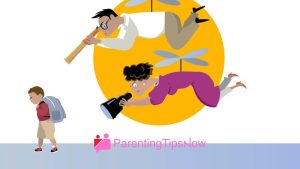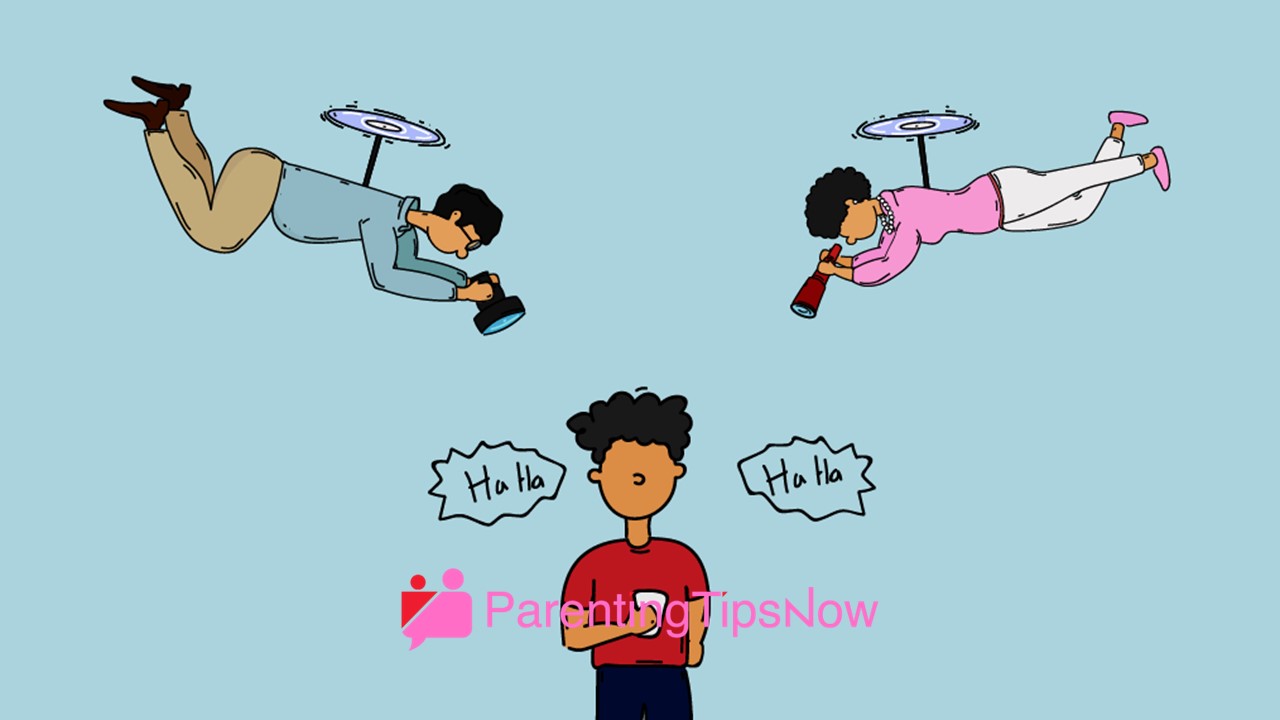Table of Contents
ToggleHelicopter parenting is when parents are over-involved in their child’s life. They hover around them and try to control everything they do. This can be good or bad, depending on the situation. Some people think it’s good because the parents are trying to protect their children and keep them from making mistakes. Other people think it’s bad because it doesn’t allow the child to grow up and learn from their mistakes.
What Is Helicopter Parenting?
In recent years, the term “helicopter parent” has become increasingly popular. But what does it actually mean?
Helicopter parenting is a parenting style characterized by close involvement with a child’s life. Helicopter parents are overprotective and often hover around their children, making sure they are safe and happy. This parenting style can be beneficial in some ways, but it can also be harmful to a child’s development.
For parents, helicopter parenting can lead to burnout. They may always worry about their child and feel like they have to be there for everything. This can be exhausting and leave them with little time for themselves.
As for children, helicopter parenting can stunt their development. They may never learn how to do things independently or cope with disappointment or setbacks. This can make them reliant on their parents and unable to function independently as adults.

What Research Says About Helicopter Parenting
There is a lot of debate about whether helicopter parenting is beneficial or harmful to children. Some people argue that it leads to spoiled, entitled kids who are unable to fend for themselves. Others believe it protects children from harm and gives them a leg up.
So what does the research say about helicopter parenting? Research on helicopter parenting is mixed, but this parenting style has some clear benefits and drawbacks. On the positive side, helicopter parents are typically very involved in their children’s lives and can provide them with great support and guidance. This can lead to better academic performance and social skills. However, helicopter parenting can also lead to problems such as anxiety and depression in children. It can also create a sense of dependence in children, making it difficult for them to cope with setbacks or challenges later in life.
It is important to remember that every child is different, and what works for one child may not work for another. If you are considering helicopter parenting, make sure to talk to your child’s doctor or teacher first to see if it is right for your family.
The History Of Helicopter Parenting
The term helicopter parenting has been on the rise since the 1990s. There are a number of factors that have contributed to this trend. One factor is the increased pressure on parents to provide their children with everything they need to succeed. Another factor is the decline in community support systems. With fewer extended family members and neighbors available to help, parents feel they need to be more involved in their children’s lives.
This type of parenting can be traced back to the 1950s, when there was a major shift in the way parents viewed their children. Prior to this, children were seen as the property of their parents, and it was not uncommon for them to be disciplined with physical violence. However, in the 1950s, psychologists began to view children as individuals with their own needs and rights. This change in thinking led to a more child-centered approach to parenting.
The Effects Of Helicopter Parenting On Children
One of the most notable changes in parenting over the past few decades has been the rise of helicopter parenting. This parenting style is characterized by over-involvement in their child’s life, from academics to extracurriculars to social life. Helicopter parents are always there for their children, whether their children want them to be or not.
There is no doubt that helicopter parenting can have some positive effects on children. For example, helicopter parents are usually very supportive and involved in their child’s life, which can lead to a stronger parent-child relationship that provides a child with a sense of safety and security. Additionally, helicopter parents often have high expectations for their children, which can motivate them to achieve more than they otherwise would.
While helicopter parenting can have some positive effects, it can also have negative consequences.
One of the main problems with helicopter parenting is that it can lead to children becoming overly reliant on their parents. This can make it difficult for them to cope when they have to face challenges on their own. Additionally, helicopter parenting can stunt a child’s ability to develop independence and self-reliance. One of the most significant problems is that it can lead to a sense of entitlement in children.
The Benefits Of Helicopter Parenting
The benefit of helicopter parenting is that it often leads to closer relationships between parents and children. Because helicopter parents are so involved in their children’s lives, they tend to develop strong bonds with them. This can be a great advantage as children grow older and enter adulthood.
Helicopter parents are usually very involved in their child’s education. They may attend school functions, help with homework, and meet with teachers regularly. This level of involvement can help ensure that a child is getting the best possible education.
Helicopter parents are also usually very supportive of their children. They provide emotional support and encouragement, which can be extremely beneficial for a child’s self-esteem and well-being.
Additionally, helicopter parents often have high expectations for their children. This can motivate kids to achieve more than they otherwise would have if left to their own devices. And finally, helicopter parents can provide much-needed structure and stability in a child’s life.

The Drawbacks Of Helicopter Parenting
The drawbacks of helicopter parenting are well-documented. When parents hover too much, their children can become overly dependent, anxious, and unable to cope with setbacks.
One of the most common criticisms of helicopter parenting is that it creates a sense of entitlement in children. When parents are always there to catch them, children can start to believe that they don’t have to work hard or take risks. This can lead to problems later in life when they face challenges they’re unprepared for.
Another downside of helicopter parenting is that it can stifle creativity and independence. If children are never given a chance to explore or solve problems independently, they’ll never learn how to do these things.
While helicopter parenting has some drawbacks, it’s important to remember that every family is different, and what works for one might not work for another.
When Helicopter Parenting Goes Too Far
When helicopter parenting goes too far, it can have a negative effect on the child. For one thing, it can make the child feel suffocated and unable to breathe. Additionally, it can make the child feel like he or she is not competent enough to do things on his or her own. This can lead to a lack of confidence and self-esteem.
There are a few things that you can do if you think you may be helicoptering your child too much. First, try to take a step back and give your child some space.
How To Know If You’re A Helicopter Parent
Do you find yourself constantly worried about your child’s well-being? Do you feel the need to micromanage their every move? If so, you may be a helicopter parent.
Helicopter parenting is a term used to describe a parent who is overly involved in their child’s life. While it’s natural to want to protect your child, helicopter parenting can actually do more harm than good.
If you’re not sure whether or not you’re a helicopter parent, here are some signs to look out for:
- You’re always checking up on your child. Whether it’s calling them several times a day or sending them frequent text messages, you always need to know what they’re doing and where they are.
- You hover around them constantly.
- If you’re always hovering in the background, watching your child’s every move, it may be time to back off. 3. You set strict rules and high expectations for your child.
- You’re always telling your child what to do and what not to do, and you often set very high expectations for them. You may even get angry when they don’t live up to those expectations.
- You want to be where they are at all times.
- If you don’t want your child to go somewhere unless you’re with them, then that’s a sign that you may be smothering them.
- You monitor all of their online activities. You often check your child’s social media accounts and search through their text messages and emails.
FAQs About Helicopter Parenting
Are you a helicopter parent? If you hover too closely with your child and don’t allow them to grow independently, you may be stunting their development. Here are some FAQs about helicopter parenting to help you see if you need to give your child more space.
- What is helicopter parenting?
Helicopter parenting is when parents hover too close to their children and don’t allow them to grow independently. This can be detrimental to a child’s development as they don’t learn how to cope with challenges on their own.
- How can I tell if I’m a helicopter parent?
If you find yourself constantly worrying about your child and wanting to protect them from any possible harm, then you may be a helicopter parent.
Final Thoughts: Is Helicopter Parenting Good For Kids?
In conclusion, is helicopter parenting good for kids? The answer may vary depending on who you ask, but ultimately, it is up to the parent to decide what is best for their child. Some may say that helicopter parenting can lead to children who are not independent and lack self-confidence, while others may say that it leads to children who are protected and have a strong sense of family. Ultimately, the decision lies with the parent and what they feel is best for their child.














